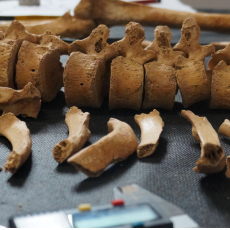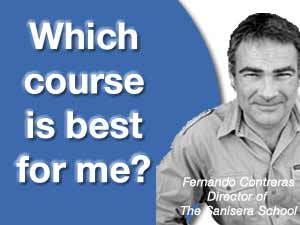General Information
 The Sanisera Archaeology Institute for International Field Schools offers an annual international archaeology program. Since then it has organized courses for students who come from all over the world to study abroad and who are interested in forensic archaeology, anthropology and osteology.
The Sanisera Archaeology Institute for International Field Schools offers an annual international archaeology program. Since then it has organized courses for students who come from all over the world to study abroad and who are interested in forensic archaeology, anthropology and osteology.
The fieldwork focuses on the in-depth analysis of human skeletal remains excavated from a necropolis discovered in the town of Lucena (Córdoba, Spain) dated between the 4th - 8th centuries AD. The goal is to use advanced osteological techniques to understand the lifestyle of the people who lived on this site.
The Lucena necropolis, known to archaeologists as "Cortijo Coracho", is one of the largest cemeteries in Spain from the Late Antiquity period and was partially excavated during 2003. From the archaeological excavation work, 273 tombs could be documented, and 397 individuals could be counted, of which 151 have been analyzed so far.
According to the first hypotheses, this cemetery was surrounding an early Christian church that must have been founded with the construction of a martyrium or memory to bury the corpse of a saint or martyr in the area.
The burials correspond to a community of settlers and peasants during the times of the Visigoth and Byzantine domination of this territory of Spain.
The skeletal remains in this collection are unbeatable for the student because they are in an excellent state of preservation and also belong to articulated, practically complete individuals.
Bioanthropology internships will serve to complete the ongoing osteological research study.
Participants will learn the techniques of analyzing and recording information from human skeletal remains in an archaeological context. In this lab-based course, both lecture and experiential learning will be used to enable students to gain confidence in the identification and analysis of various skeletal conditions.
We will cover skills in basic demographics such as the techniques to determine age and sex of a skeleton, but will also progress to more advanced methodologies in osteological analysis. Students will learn skills such as: correctly measuring and recording skeletal elements according to set international standards , distinguishing between pathological and non-pathological bone and assessing patterns in pathological lesions, identifying marks on the skeleton that indicate how muscles were used during the person's life (including determining left or right handedness), and assessing nutritional status from bones and teeth. Additionally, participants will learn how to bring these different sources of information together to re-create the biological life history of the individuals buried at this site.
The bone collection of the "Cortijo Coracho" necropolis is deposited in the Archaeological Museum of Lucena (Córdoba, Spain). In this museum, the students will carry out the practices of this bioarchaeology course.
The classes will be taught by Dr. Ricardo Ortega, who was lucky enough to collaborate in the excavation project for the tombs of the necropolis, and will be promoted by the Institute for Professional Training in Forensic Sciences from Spain.
The archaeological museum of Lucena will be the laboratory where the bioarcheology practices will be carried out Panoramic view of the Lucena necropolis when it was excavated in 2003. Excavated grave with evidence of an articulated skeleton of a young individual Using the ideal techniques to carry out an osteological study The human bones of Lucena present an optimal state of conservation to carry out bioarcheology practices
A dental study of the Lucena collection will be carried out











